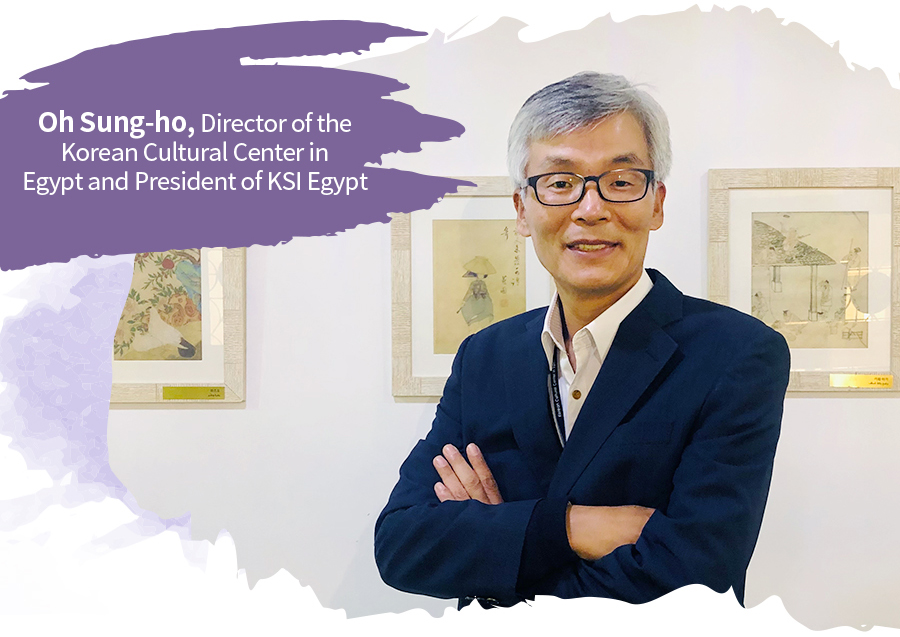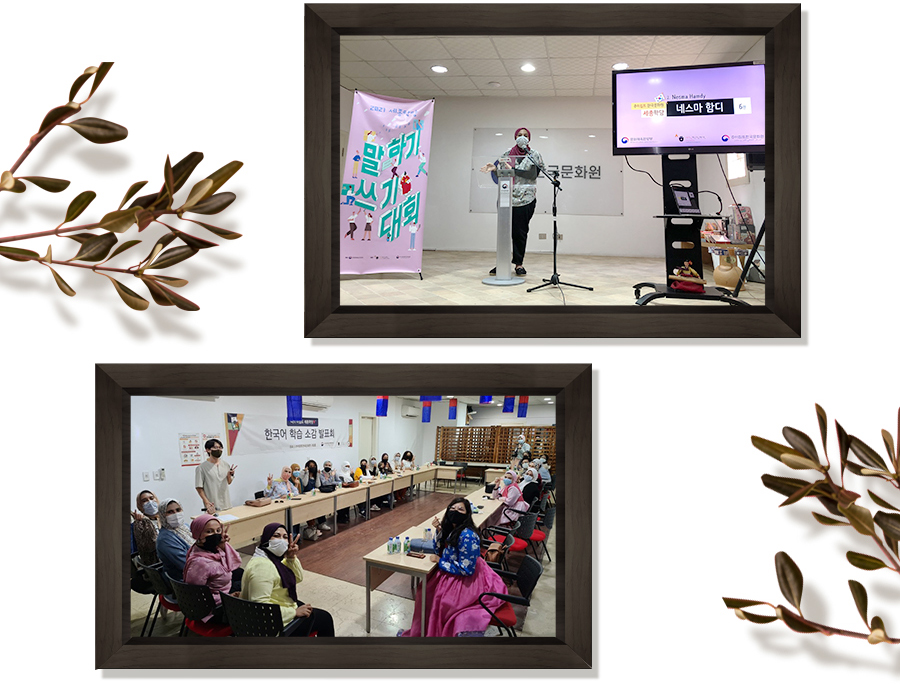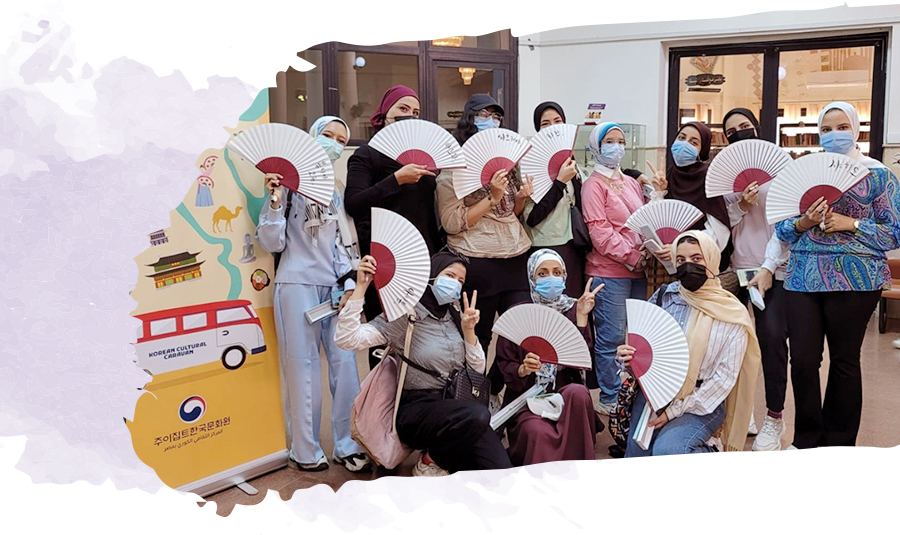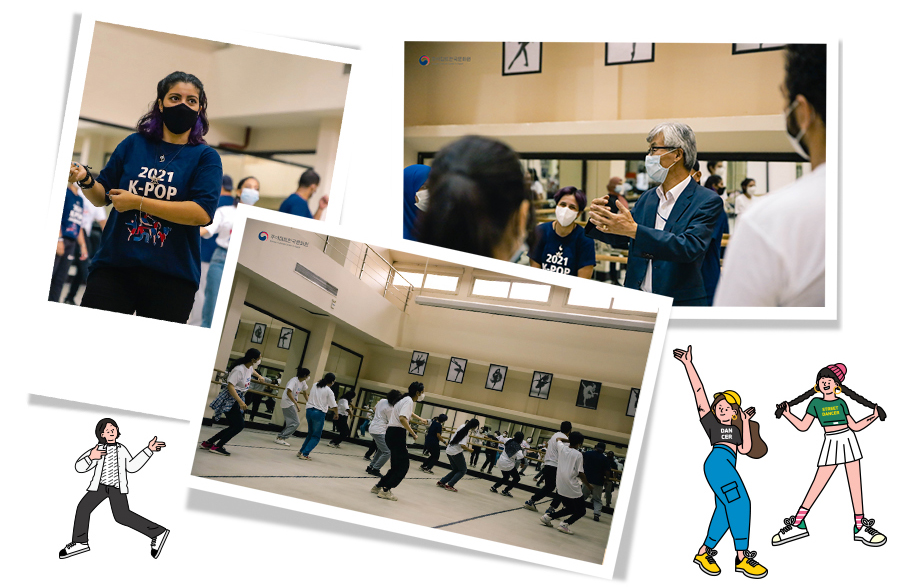Writer홍보협력팀
Tag
2021-12-15
View569



“The Korean language is the essence of Korean culture, and encouraging Korean language learning is the best way to promote the culture of Korea.” These are the words from Director Oh Sung-ho, who is a strong advocate of this belief. We interviewed Oh Sung-ho who heads the Korean Cultural Center of Egypt, as well as KSI Egypt which is a part of the Cultural Center. President Oh explained the strides he has made as a Korean language education expert and his future plans.
 What was your career path and how did it lead you to become the director of the Korean Cultural Center of Egypt and the President of KSI Egypt?
What was your career path and how did it lead you to become the director of the Korean Cultural Center of Egypt and the President of KSI Egypt?I worked for the Government Policy Coordination Office for a long period of time where I was responsible for developing key cultural policies. I naturally became interested in promoting Korean culture and language in other parts of the world, and therefore applied for a position in the cultural section of the Korean Embassy in the Islamic Republic of Iran in 2015.
It was not easy for me to imagine myself working as a public officer overseas even as I boarded the flight to Tehran, the capital of Iran. However, Iran proved me wrong. The country reminded me of what first love felt like. I fell in love with the sight of Iranians enjoying happiness and freedom while learning Korean culture. The conversations I had with those learning and developing their own talents and potentials with the Korean language that they learned made me realize something extremely important. It was that the Korean language was indeed the essence of Korean culture, and helping more and more people learn it was the best way to promote our culture overseas. With that in mind, I began to get myself more involved in the Korean language education business led by the KSIF.
It was in February this year that I began working for the Korean Cultural Center in Egypt. Among all countries in the Middle East, Egypt is the one that’s the most passionate about learning the Korean language. I feel honored and privileged to be leading the KSI here in Egypt, a country that plays the role of a bridgehead between the Middle East and Africa.
 Around eight years have passed since the Korean Cultural Center KSI first opened in Egypt. Did you encounter any difficulties during this period?
Around eight years have passed since the Korean Cultural Center KSI first opened in Egypt. Did you encounter any difficulties during this period?KSI Egypt was founded in 2014 along with the Korean Cultural Center of Egypt. The Korean language business in Egypt was first introduced back in 1995 when diplomatic ties were first established between the two countries. The small classroom in the Embassy of Korea in which Korean language is taught grew crowded with excited learners over time and Hallyu, the Korean Wave also began to blow through Egypt with today"s BTS, Squid Game, and back then Winter Sonata which started it all. A Korean language department was even opened at Ain Shams University in Cairo, Egypt, in 2005 for the first time in the Middle East-Africa region.
KSI is currently receiving a large number of applicants showing keen interest in Korean culture also leading to growing interest in learning the language. However, the problem that has continued to exist from the very beginning of the KSI’s history is that it simply does not have enough teachers to teach Korean compared to those who want to learn. The number of Korean teachers that can teach Korean professionally and systematically in Egypt is extremely limited and there aren’t enough Korean language education institutes. All of this makes fostering local Korean language teachers even more difficult. It has always been regrettable that we were only able to accept less than 1% of the thousands of potential Korean language learners that come to KSI Egypt, all looking for a chance to learn the language.
We’re currently doing our best to solve this issue. This year we have increased the number of teachers to be dispatched to KSI Egypt to five, which had stayed at the minimum level possible ever since 2019, and we are actively hiring more local teachers. Starting next year, we plan to secure as many teachers in Egypt as possible by actively rolling out our local teacher education program.
What’s more, we’re doing our best to offer our learners diverse Korean cultural experiences. The benefits of our institute are that learners not only can participate in cultural education programs hosted by KSI, but also cultural events organized by the Cultural Center. For example, the Korean Cultural Center hosted a large-scale event, Korean Culture Week, in October. The learners actively participated in every part including planning events such as the screening of Korean movies, K-pop contest, and the Korean handicraft exhibition. I was filled with emotion when I saw learners promoting Korean movies in the Arabic language and showing their friends how to dance to K-pop music, which they learned through watching YouTube. It made me very proud to see them going beyond simply learning Korean language and culture and actively sharing their experiences with others. I sincerely hope that our Center and KSI can help bring them one step closer to the language and culture of Korea.
The Korean Cultural Center KSI Egypt has continued its growth trajectory thanks to all the support and help received from the government, universities, and Korean language teachers. We will continue to resolve issues confronting us, and march confidently toward the future, just as we have always done for the past eight years.

 How has Egyptians" interest in the Korean language and culture changed?
How has Egyptians" interest in the Korean language and culture changed?As mentioned earlier, Egyptians’ interest in Korea began to grow since the early 2000s. As more and more people are becoming fascinated by Korean culture, the number of Korean culture fans in Egypt is also growing. Around 80 K-pop social clubs with as many as 200,000 members are operating in Egypt. In addition, it is not uncommon to see Egyptian teenagers come up to me and say Annyeonghaseyo, even though in a not so fluent accent when I’m walking along the banks of the Nile River. When I recently took a cab, the cab driver who seemed to be a teenager all of a sudden asked if I knew Squid Game, the popular Netflix series, and began to talk about his passion for Korean soap operas.
Interest in Korean culture naturally leads to learning the Korean language. One day I asked a high school student attending our institute what motivated her to study Korean. She said she decided to learn Korean after the subtitles to the Korean drama she was watching couldn’t quite help her understand the three-line acrostic poem that came up. Meeting these passionate learners always makes me feel that I have to invest more in Korean language education, which is the final step when it comes to promoting Hallyu.
 Was there a particularly memorable event during the time you have been operating the Korean Cultural Center of Egypt and the KSI?
Was there a particularly memorable event during the time you have been operating the Korean Cultural Center of Egypt and the KSI?Among all of the events co-hosted between the Korean Cultural Center and the KSI, Korean Cultural Caravan is the one that’s the most memorable to me. As part of the event, we visited provincial cities of Egypt to promote Korean culture, in the belief that hosting it only in Cairo, the capital, wasn’t going to be enough to bring Korean culture closer to the country. We went to Port Said, a port city that lies in the north of Egypt, and held a wide variety of programs such as movie screenings, exhibitions, and exhibitions of Korean traditional culture and food. And that’s not all. The teachers of the KSI also gave Korean calligraphy classes and lectures on basic Korean expressions.
When planning the event, I was concerned that perhaps the Korean Wave was coming to a standstill due to the spread of the coronavirus pandemic. However, I soon discovered that I was worried for nothing. We had as many as 600 people visiting the venue, so we even had to control their access in order to comply with the Covid-19 restrictions. We originally planned to accommodate up to 30 learners in each of the morning and afternoon sessions for basic Korean expressions, but found ourselves with hundreds of eager potential learners waiting outside the classroom. We thus improvised and made some more seats available by putting together some tables since we simply couldn’t just send them back home. The teacher who taught calligraphy had a hard time writing the names of the hundreds of learners on buchae, the traditional Korean hand-held fan. Although hosting the event came with some difficulties, it was indeed a rewarding day that made all those hardships worthwhile.
Korean Cultural Caravan presented me with an opportunity to see the huge synergy created when events are co-hosted by the Korean Cultural Center and the KSI. The fact that we worked together and overcame the same problems made the experience even more rewarding. Starting next year, the two institutes will join hands more actively to host these local events every month to bring Korean language and culture closer to the Egyptian’s daily lives.

 What are some of the changes affecting the Korean Cultural Center and KSI Egypt due to the spread of the pandemic?
What are some of the changes affecting the Korean Cultural Center and KSI Egypt due to the spread of the pandemic?During the initial spread of the pandemic, our institute had no other option but to cancel all our classes. Over time, we began to have all our classes online instead. All of our teachers and learners had to experience inconvenience and confusion at first due to the drastic change, but not everything that the change led to was bad. For example, the online classes enabled learners outside Cairo to take part in the Korean classes as well, as they no longer had to travel long distances. This meant a lot especially in a Muslim country like Egypt where women’s outdoor activities are restricted.
However, it’s also true that the physical disconnection led to limitations in communication. To improve weak communication, our institute has been diversifying communication channels among teachers, between teachers and learners, and among learners. First of all, we’re hosting seminars for teachers every month to strengthen cooperation among them. In addition, our monthly cultural events that take various forms help learners communicate with their peers as well as teachers outside the classroom. Contact-free events such as a Korean language studying VLOG contest and an online four-character idiom quiz and face-to-face events including a presentation session on learners’ experience learning Korean and an event to celebrate Hangeul Day are some of the examples. Our institute will continue to create an environment where learners and teachers can maintain a solid bond with one another even amid difficult times by offering both online and offline events.
 Please tell us about the future goals and plans of KSI Egypt.
Please tell us about the future goals and plans of KSI Egypt.The Korean Cultural Center KSI Egypt is like the outpost of introducing and facilitating Korean language education in Egypt. We will focus on putting in place a curriculum and an administrative system that’s more systemic in order to set an example that can inspire other institutes teaching Korean language.
Once our Korean Cultural Center KSI’s operation becomes stabilized, our plan is to establish KSI centers in regional hubs of Egypt such as Alexandria, Aswan, and Luxor. We will also spare no effort in supporting the establishment of Korean language departments in major Egyptian universities. In addition, we will more actively collaborate with government bodies, universities, and also businesses to give KSI graduates a chance to pursue their careers using Korean. Our ultimate goal is to lay the groundwork for Korean to be designated as Egypt’s second foreign language. I strongly believe that we will soon have a future where every Egyptian can have the opportunity to learn Korean at the KSI, universities, and in their middle and high schools.
 Finally, is there anything you would like to say to the KSI learners and staff members around the world?
Finally, is there anything you would like to say to the KSI learners and staff members around the world?I was very happy to hear that our KSI’s operating practice won the grand prize in a regional workshop held recently and that it made many KSI members feel more motivated. It made me realize that KSIs around the world shared the same concerns and felt fulfilled and rewarded in similar situations.
I’m very proud of all the teachers at our institute who do their best to spread Korean language and culture despite the tough times, and also the thousands of learners who come to us filled with love and passion toward Korea. I’m confident that together we can make the KSI become the lifeline of Korean language and culture ─ just as how Egypt, a country surrounded by the desert, has such a rich history and culture shaped by the Nile River, and became a melting pot with different cultural backgrounds all blended together.
